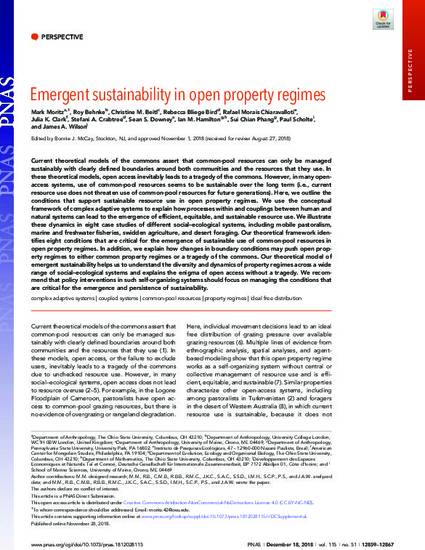
Article
Emergent Sustainability in Open Property Regimes
Proceedings of the National Academy of Sciences
(2018)
Abstract
Current theoretical models of the commons assert that common-pool resources can only be managed sustainably with clearly defined boundaries around both communities and the resources that they use. In these theoretical models, open access inevitably leads to a tragedy of the commons. However, in many open-access systems, use of common-pool resources seems to be sustainable over the long term (i.e., current resource use does not threaten use of common-pool resources for future generations). Here, we outline the conditions that support sustainable resource use in open property regimes. We use the conceptual framework of complex adaptive systems to explain how processes within and couplings between human and natural systems can lead to the emergence of efficient, equitable, and sustainable resource use. We illustrate these dynamics in eight case studies of different social–ecological systems, including mobile pastoralism, marine and freshwater fisheries, swidden agriculture, and desert foraging. Our theoretical framework identifies eight conditions that are critical for the emergence of sustainable use of common-pool resources in open property regimes. In addition, we explain how changes in boundary conditions may push open property regimes to either common property regimes or a tragedy of the commons. Our theoretical model of emergent sustainability helps us to understand the diversity and dynamics of property regimes across a wide range of social–ecological systems and explains the enigma of open access without a tragedy. We recommend that policy interventions in such self-organizing systems should focus on managing the conditions that are critical for the emergence and persistence of sustainability.
Keywords
- complex adaptive systems,
- coupled systems,
- common pool resources,
- property regimes,
- ideal free distribution
Disciplines
Publication Date
2018
DOI
https://doi.org/10.1073/pnas.1812028115
Citation Information
Mark Moritz, Roy Behnke, Christine M Beitl, Rebecca Bliege Bird, et al.. "Emergent Sustainability in Open Property Regimes" Proceedings of the National Academy of Sciences Vol. 115 Iss. 51 (2018) p. 1285 - 12867 Available at: http://works.bepress.com/christine_beitl/11/
